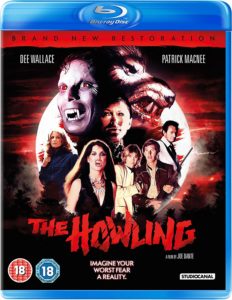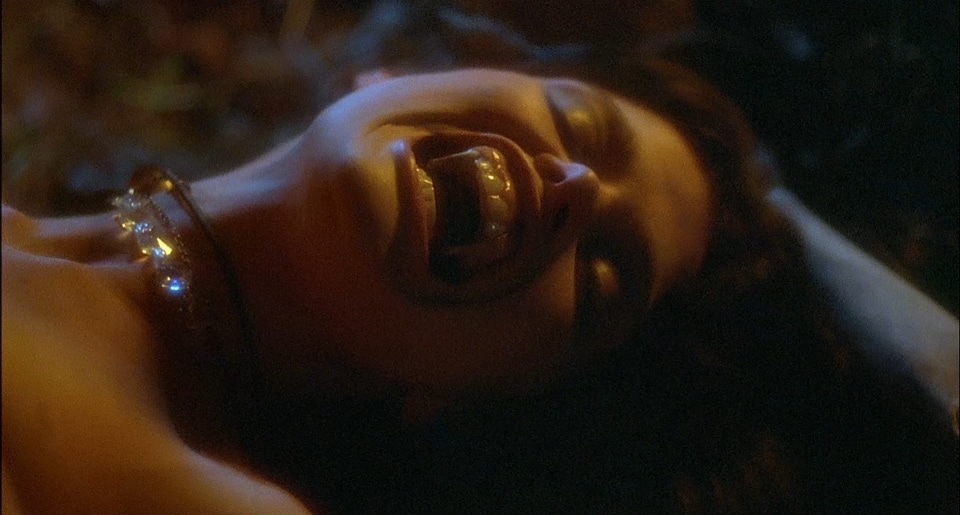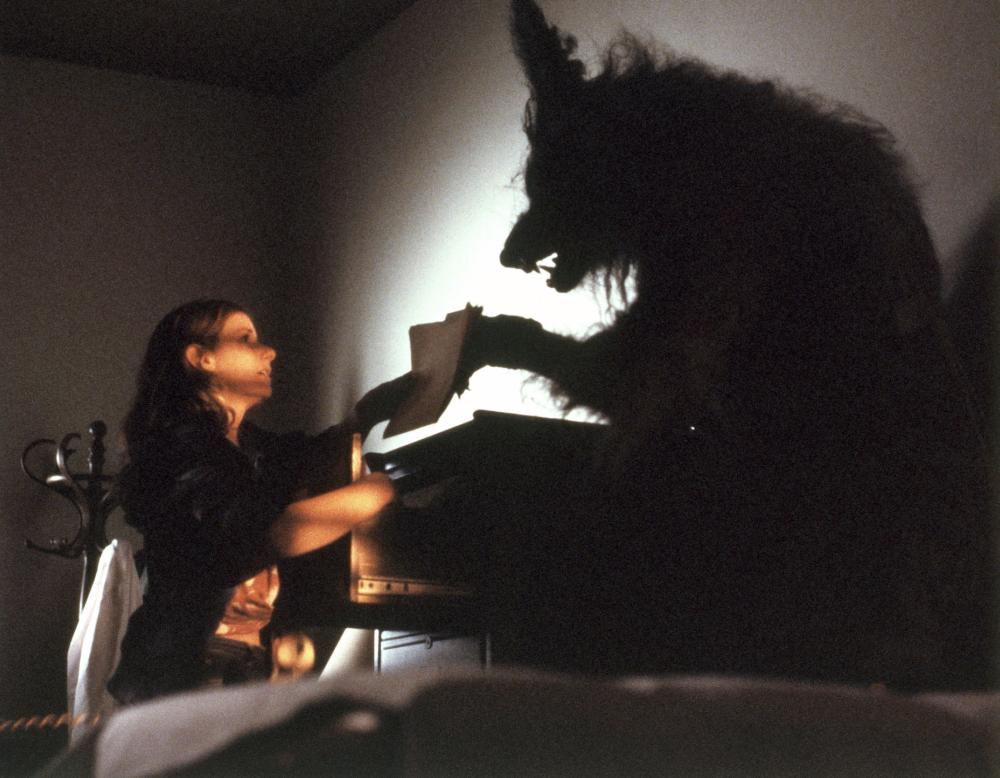 As every horror fan under the sun (or silvery moon) will bore you to death explaining if you let them, the 1980s were the greatest decade for practical creature FX work in the movies; indeed, it was the era in which the term ‘special make-up effects’ really entered the vernacular. Small wonder, then, that the decade also saw a boom in werewolf movies. We tend not to see werewolves as the central monster quite so often as vampires or zombies, and the most likely reason for this is that they’re a lot harder to get right; so often they just wind up looking like vintage Toho man-in-suit monsters, as opposed to the truly terrifying beasts the filmmakers would doubtless prefer. But with the technical advances of the 80s, genuinely lifelike and scary wolfmen suddenly seemed in reach – and, notoriously, a whole bunch of filmmakers got that same idea at the same time, as 1981 kick-started a new wave of werewolf horror with the release of three key films: John Landis’ An American Werewolf in London, Michael Wadleigh’s Wolfen – and, of course, the film we’re here to talk about, Joe Dante’s The Howling, getting a brand spanking new home entertainment release from Studiocanal just in time for Halloween. While I should expect the bulk of us will agree that Landis’ film had the greatest impact, it was Dante’s which spawned a lengthy, albeit tenuously-linked franchise, as well as launching its director into the big leagues. So, how does it hold up 36 years later?
As every horror fan under the sun (or silvery moon) will bore you to death explaining if you let them, the 1980s were the greatest decade for practical creature FX work in the movies; indeed, it was the era in which the term ‘special make-up effects’ really entered the vernacular. Small wonder, then, that the decade also saw a boom in werewolf movies. We tend not to see werewolves as the central monster quite so often as vampires or zombies, and the most likely reason for this is that they’re a lot harder to get right; so often they just wind up looking like vintage Toho man-in-suit monsters, as opposed to the truly terrifying beasts the filmmakers would doubtless prefer. But with the technical advances of the 80s, genuinely lifelike and scary wolfmen suddenly seemed in reach – and, notoriously, a whole bunch of filmmakers got that same idea at the same time, as 1981 kick-started a new wave of werewolf horror with the release of three key films: John Landis’ An American Werewolf in London, Michael Wadleigh’s Wolfen – and, of course, the film we’re here to talk about, Joe Dante’s The Howling, getting a brand spanking new home entertainment release from Studiocanal just in time for Halloween. While I should expect the bulk of us will agree that Landis’ film had the greatest impact, it was Dante’s which spawned a lengthy, albeit tenuously-linked franchise, as well as launching its director into the big leagues. So, how does it hold up 36 years later?
Dee Wallace (pre-ET) is TV news anchorwoman Tits McGee – sorry, Karen White – and, seemingly willing to go to any lengths for a good story, she has agreed to a meeting with serial killer Eddie Quist (Dante regular Robert Picardo). While she’s supposed to be under surveillance from both her team and the police the whole time, things naturally go wrong, and Karen finds herself trapped in a backroom booth of a porn store with a murderer who, to her understandable shock, seems to be quite literally inhuman. Saved at the last second by a trigger-happy cop, Karen is naturally traumatised by the events and unable to return to work. However, her station is very friendly with Dr George Waggner (The Avengers legend Patrick Macnee, playing a character so named for the director of 1941’s The Wolf Man), an influential psychiatrist and author who promotes a philosophy of embracing our inner animal nature. He invites Karen, along with her husband Bill (Christopher Stone), to his country retreat populated by those who subscribe to his unleash-the-beast philosophy. Sounds like a cult, right? But, given all this preceding talk about werewolves, we all know there’s a whole lot more to it than that.
In the context of Dante’s broader filmography, The Howling does seem something of an anomaly given that, for the most part, it’s outwardly played straight. The script from John Sayles and Terence Winkless – by all accounts an extremely loose adaptation of Gary Brandner’s novel, on which the film is officially based – seems to be aiming quite high for much of the time, taking stabs at the post-hippy trend for gurus, alternative therapy and pop occultism. Efforts are also made toward a realistic portrayal of a marriage in breakdown, via Karen and Bill’s strained relationship. However, it seems clear that the director is far less interested in the psychodrama and any pretence of social commentary than he is in making a simple, fun B-movie; which, as we know, has always been Dante’s strength. While the anarchic humour that typically permeates his work is more understated here, it’s far from absent, and plenty of Dante’s key motifs pop up: scenes from vintage monster movies (in this case The Wolf Man, of course) on TV; a supporting role for Dick Miller, plus a small role for aged horror icon John Carradine and Hitchcock-ish cameos for Roger Corman and Forry Ackerman (holding a pile of Famous Monster mags, no less). Better to focus on this and have fun than get too worried about a script which tends to get a little bogged down with dull subplots, the worst offender being the investigation thread back in the city, with Dennis Dugan and Belinda Balaski’s characters.
 Given that The Howling largely hinges on the notion of the beast as the embodiment of our underlying carnal nature, it would be easy to class it is a conservative-leaning film, which literally demonises those that break the sanctity of marriage; but watching the film, there’s really no question which group the director really sympathises with. Look no further than the femme fatale role, brought so brilliantly to life by the late Elisabeth Brooks, one of The Howling’s greatest strengths. Oozing dark humour as much as sex appeal, the sadly short-lived actress will always be remembered for this role, and in particular for what has to be one of the most memorable sex scenes in horror.
Given that The Howling largely hinges on the notion of the beast as the embodiment of our underlying carnal nature, it would be easy to class it is a conservative-leaning film, which literally demonises those that break the sanctity of marriage; but watching the film, there’s really no question which group the director really sympathises with. Look no further than the femme fatale role, brought so brilliantly to life by the late Elisabeth Brooks, one of The Howling’s greatest strengths. Oozing dark humour as much as sex appeal, the sadly short-lived actress will always be remembered for this role, and in particular for what has to be one of the most memorable sex scenes in horror.
As for the werewolves themselves… well, it was of course inevitable that any other representation of the beast arriving in the same year as An American Werewolf in London was going to look pretty weak by comparison. Sure, the metamorphosis sex scene is striking, but more on account of its audacity than anything else, with Rob Bottin’s transformation FX paling in comparison to those of his mentor Rick Baker on John Landis’ film. But even if we try to put those comparisons to one side, there’s no denying that the fully transformed werewolves look a little awkward, as do some of the brief uses of animation (both traditional 2D and stop-motion). Even so, a little goofiness is more often than not part of the fun with any good monster movie; let’s face it, Jack Pierce’s Wolf Man make-up for Lon Chaney Jr always looked pretty ridiculous, didn’t it? In any case, there are still some genuinely quite sinister moments – notably the opening and closing sequences – which rank among the scariest scenes Dante has ever put to film.
Indeed, when you look back over Joe Dante CV and see just how few bona fide scary movies he’s made, his enduring status as a horror master may seem curious. As such, The Howling is perhaps the key film in earning him that title, and – even if it’s not as good as American Werewolf in London – it surely warrants a spot on the top 10 werewolf films of all time. This is the film’s real legacy, and certainly not the largely subpar string of increasingly far-removed sequels that came after without Dante’s involvement.
This fine-looking edition will be welcome on the shelf of any horror fan, and boasts extras from an existing Scream Factory edition: interviews with series producer Steven A Lane, editor Mark Goldblatt, co-writer Terence Winkless and stop-motion animator David Allen, plus a look at the film’s locations.
The Howling is released to Blu-ray, DVD and digital download on 9th October, from Studiocanal.
